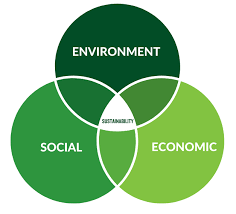“`html
The Importance of Sustainability
Sustainability is a crucial concept that has gained increasing recognition in recent years. It refers to the responsible use of resources to meet current needs without compromising the ability of future generations to meet their own needs.
One of the key aspects of sustainability is environmental conservation. By adopting sustainable practices such as reducing waste, conserving energy, and protecting natural habitats, we can minimize our impact on the planet and preserve its resources for future generations.
Moreover, sustainability extends beyond environmental concerns to encompass social and economic dimensions. Sustainable development seeks to create a balance between economic growth, social equity, and environmental protection, ensuring that progress is inclusive and beneficial for all members of society.
Businesses are increasingly recognizing the importance of sustainability in their operations. Many companies are implementing eco-friendly practices, such as using renewable energy sources, reducing carbon emissions, and promoting ethical supply chains. By embracing sustainability, businesses can not only reduce their environmental footprint but also enhance their reputation and attract environmentally conscious consumers.
Individuals also play a crucial role in promoting sustainability. By making simple changes in daily habits, such as recycling, conserving water, and supporting sustainable products, each person can contribute to a more sustainable future for all.
In conclusion, sustainability is essential for safeguarding the well-being of current and future generations. By embracing sustainable practices at all levels – individual, community, business, and government – we can create a more resilient and harmonious world for everyone.
“`
Understanding Sustainability: Key Questions and Answers for a Greener Future
- What is sustainability and why is it important?
- How can individuals contribute to sustainability?
- What are the benefits of adopting sustainable practices?
- How does sustainability impact the environment?
- What role do businesses play in promoting sustainability?
What is sustainability and why is it important?
“`html
Sustainability is the practice of meeting the needs of the present without compromising the ability of future generations to meet their own needs. It involves responsible resource management, environmental conservation, and social equity. Sustainability is important because it ensures that we can continue to thrive on Earth without depleting its resources or causing irreparable harm to the environment. By promoting sustainable practices, we can create a more resilient and equitable society, protect biodiversity, mitigate climate change, and secure a better future for all living beings on the planet.
“`
How can individuals contribute to sustainability?
“`html
Individuals play a crucial role in promoting sustainability through their daily actions and choices. There are several ways in which individuals can contribute to sustainability. One effective way is to reduce waste by recycling and composting, as well as by opting for reusable products instead of single-use items. Conserving energy and water at home, using public transportation or carpooling, and supporting local and sustainable businesses are also impactful ways for individuals to contribute to sustainability. By making conscious decisions in their lifestyles and consumption habits, individuals can collectively make a significant positive impact on the environment and work towards a more sustainable future.
“`
What are the benefits of adopting sustainable practices?
“`html
Adopting sustainable practices offers a myriad of benefits that extend beyond environmental conservation. By choosing to embrace sustainability, individuals, businesses, and communities can contribute to a healthier planet, reduce resource depletion, and mitigate climate change. Sustainable practices also lead to cost savings through energy efficiency measures and waste reduction strategies. Additionally, embracing sustainability can enhance brand reputation, attract environmentally conscious consumers, and foster innovation in product development and business operations. Ultimately, the adoption of sustainable practices paves the way for a more resilient and equitable future for all.
“`
How does sustainability impact the environment?
Sustainability has a profound impact on the environment by promoting practices that aim to preserve and protect natural resources for future generations. By adopting sustainable measures such as reducing carbon emissions, conserving water, and minimizing waste, we can mitigate the negative effects of human activities on ecosystems and biodiversity. Sustainability also encourages the use of renewable energy sources and sustainable agricultural practices, which help reduce pollution and deforestation. Ultimately, embracing sustainability not only helps mitigate environmental degradation but also fosters a healthier planet for all living beings to thrive in harmony.
What role do businesses play in promoting sustainability?
Businesses play a pivotal role in promoting sustainability by incorporating eco-friendly practices into their operations. By adopting sustainable strategies such as reducing waste, conserving energy, and sourcing ethically produced goods, businesses can minimize their environmental impact and contribute to a more sustainable future. Moreover, businesses have the opportunity to influence consumer behavior by offering sustainable products and services, thereby encouraging a shift towards more environmentally conscious consumption patterns. By prioritizing sustainability in their practices, businesses not only contribute to the preservation of the planet’s resources but also enhance their reputation and competitiveness in an increasingly environmentally aware market.

